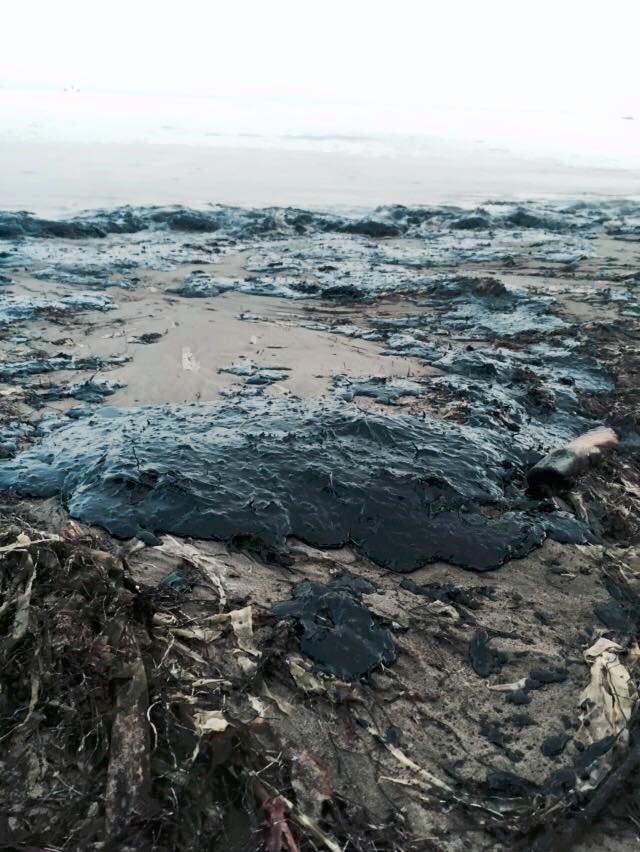Editor’s note: You can act by emailing the Interior Department to stop future oil leasing plans, which affect our region. You have the Sierra Club behind you at this link: https://tinyurl.com/BanOilLeasing
By Katie Davis
It was five years ago, May 19, 2015. I was sitting in the SB County Board of Supervisors meeting having a fight with oil companies over climate change. We were arguing that new sources of pollution from oil production was significant. They were blaming China and claiming that nothing we do matters in the global scheme of things. We were winning.
Suddenly our phones lit up with news there was an oil spill on the Gaviota Coast. The pipeline was badly corroded and there was no automatic shut off. It spilled 142,000 gallons of oil down a culvert onto Refugio State Beach and into the ocean before shut down.
Our beaches in Goleta were closed that summer. Our economy took a hit. White-suited hazmat workers cleaned miles of beaches.
You can’t completely clean up an offshore oil spill. The oil sinks into the marine environment, damaging fragile underwater ecosystems, killing or contaminating fish and smaller organisms that are essential links in the food chain, including the food we eat. The environmental damage can last for decades.
More than 300 dolphins, seals, sea lions, pelicans and other birds and animals washed up dead. Many others were found alive and suffering. Oil clogs the blow holes of whales and dolphins, affecting their ability to breathe and communicate. It coats the fur of seals and birds impairing their ability to float, fly, and regulate temperatures. They die of hypothermia or toxicity or starvation. They go blind or develop birth defects or tumors.
Plains All American Pipeline was eventually convicted of a felony for its negligence in causing the spill, but while the prosecutors suggested a fine of $1 billion, the company was fined only $3.3 million. (Assembly member Monique Limón introduced a bill this session that would increase those maximum fines.)
Since that day five years ago, Exxon’s offshore platforms have been shut down, as have their polluting onshore processing facilities, which had been the largest facility source of greenhouse-gas emissions in the county. Exxon wants to restart those offshore platforms. Given the unusable pipeline, they have proposed trucking the oil along the 101, an even less safe way to transport oil. This, in the midst of a pandemic and a global glut of oil.
At the first hearing of this trucking proposal in July 2018, I was feeling emotional. I hadn’t slept for three days after my house almost burned down in the Holiday Fire the prior week. My neighborhood was a smoky wasteland. An expert said there is a 99 percent likelihood that climate change increased the severity of the heatwave that created the freaky tinderbox in which that fire erupted a half mile from my house.
As protesters gathered in opposition to Exxon’s trucking proposal, I reminded them that as early as 1977, scientists at Exxon warned the company that, “use of fossil fuels … should not be encouraged” because of the risk they posed, but Exxon went on to undermine climate science, delay political action and post record profits. They knew heatwaves would cause the kind of climate disasters I had just experienced, and they didn’t care.
We live in a world of commingled crises. The coronavirus poses an immediate danger, particularly for those already afflicted by air pollution. And we live in a slower moving but more permanent climate crisis that is fueling mass extinctions, weather disasters, droughts, conflict and disease, and projected to cost us trillions.
As another fire season approaches, turbocharged by global warming, I fear having to evacuate when we are supposed to be socially distancing. I fear power losses when patients are in need. And I fear that oil companies are making the situation worse by seeking to loosen environmental regulations and waive-record keeping, and in our area, pursuing approval of oil projects that will lead to more oil spills and more climate change.
This year Exxon’s trucking proposal is up for a decision. The tone-deaf timing in the midst of a pandemic when oil is the last thing we need is yet one more strike against them – as if we need any more reasons to say no to Exxon.
